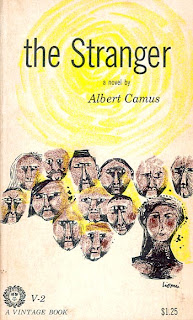
The Stranger is a tale of an absolutely senseless murder that ends a nearly senseless life, that of the killer, Meursault (we the readers know very little about the life of the Arab man murdered in this tale). We are somewhat made to feel pity for Meursault, though this sympathy is at times very difficult to summon, given the man's anomic nature.
Yet, despite the main death in the tale, there is another death which begins it all. Before page 1 has expired, the main character Meursault discusses his mother's death, funeral, and plans to be back home within a day. His boss may not be pleased at his sudden departure, he explains, but accepts Meursaults sudden departure from the city. Almost immediately, Meursault reveals his near-antipathy for family and the burden of employment. This reminds one of both post-modernist attitudes brought on by monies attained by work and the modern "first world" tendency of "hiding away" or neglecting our elderly. Moreover, it harkens to Marxist ideas of alienation from work and possibly, whether Marx was right or not, the very real, resultant apathy that so many have exhibited for work in the 20th and 21st centuries.
However, despite his callous attitude, Meursault does hold a vigil over the body of his mother. Yet, the reader may suspect that he is simply going through the motions expected of him by society -namely, feighning concern for his recently deceased mother. This is attested by the line that reads "I hadn't been in the country for ages, and I caught myself thinking what an agreeable walk I could have had, if it hadn't been for [the death of] Mother." And on page 80 there is a shocking statement: "All normal people, I added as on after-thought, had more or less desired the death of those they love, at some time or another." This is shocking, but is it true, and if so, for what percentage of people? A greater number than are in prison, perhaps? Or a greater number yet, in this world of dwindling resources and (possibly) increasing selfishness and narcissism.
Of course, one might refute any idea of the narrator's insensitivity by the very same line, as it was his mother's death that would not allow for a more tranquil walk in the countryside. Without the added words "the death of" bracketed into the quote, the interpretations may be found on a spirited spectrum of differences in opinion. It is left to the reader to decide which is more the truth.
Another interpretation, albeit at a stretch of the imagination is this: by the death of his mother, the main character is freed of manifold constraints placed upon him by his employment, his city, his grudging commitment to his girlfriend, and, as symbolized by the beach, the waves, the ocean, the sun and the Arab in the throes of lassitude, by life and even, ultimately, by Meursault himself. If this speaks to the individual, it is probably the desire of Camus.
I'd expected to read a modernized version of "Crime and Punishment," except that The Stranger, besides being more succinct, doesn't delve into the premeditation of Dostoyevsky's dreary masterpiece. In reality, the murder committed is quite spontaneous.
The tale is existential, a bit nihilistic, and heavily absurdist; if imagination be permitted to work as one reads the final pages of this novella one senses the futility of existence that we all know from time to time, the maddening quiet just before dusk no matter the time of day, and the core-rotting sadness we all must feel eventually.
Some points of interest to notice are the similarities in maltreatment that the neighbor has for his dog, and the same similar unconcerned neglect that the narrator shows to his girlfriend.
Also, the almost surreal, mentally blurred expression of the main character walking on a beach. This possesses an almost cinemagraphic visual that offers the mind perfect images of excessive sun, excessive alcohol, and a great disenchantment with life that the narrator possesses and expresses candidly, even perfectly.
A very quick read, not only for its short nature but as it reads well, and smoothly, this is a fine book that can be read in transit on a train or bus for just 15 minutes a day, coming to conclusion in less than a week. It may just make you think about your own life.
No comments:
Post a Comment